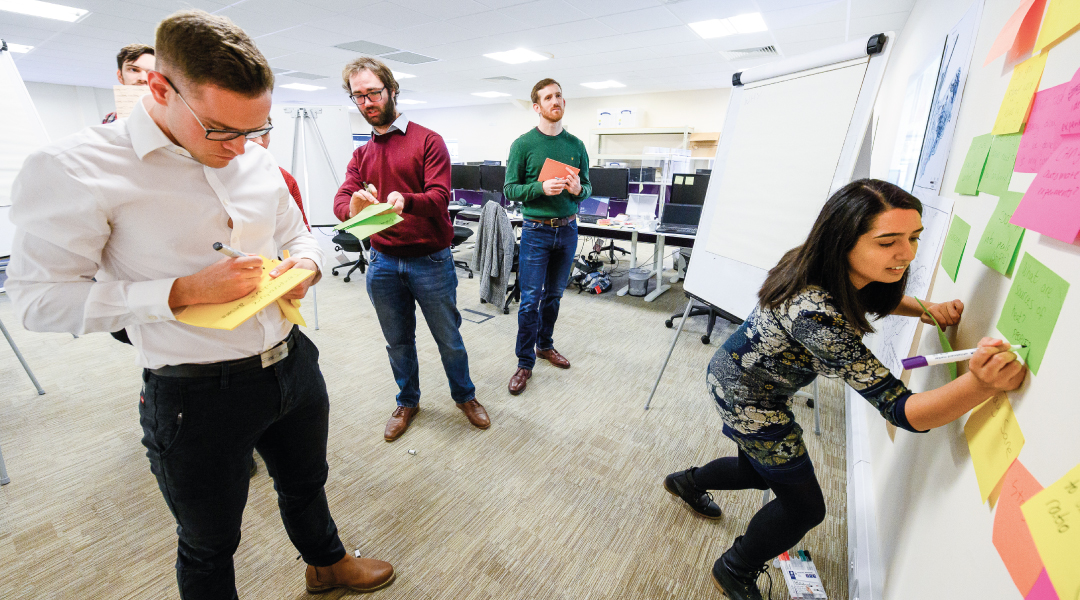CDP triumphs in challenge to help the British Antarctic Survey reach net zero
Cambridge Design Partnership’s concept to help the British Antarctic Survey reach net zero led to triumph in a Cambridge Institute for Sustainability Leadership challenge.
The virtual one-day hackathon, held on December 3 2021 and run by the University of Cambridge Institute for Sustainability Leadership (CISL) in collaboration with the British Antarctic Survey (BAS) and Cambridge Zero, brought together global innovators across business and academia. Nine teams were challenged to devise ways to help BAS achieve net zero by addressing one of three categories: energy reduction and generation, backup systems and energy storage.
Cambridge Design Partnership’s (CDP) winning submission offered a novel combination of three solutions for energy storage at BAS’s Rothera Research Station, in one of the most isolated and formidable environments on Earth: Adelaide Island to the west of the Antarctic Peninsula.
Given BAS’s emphasis on resilience and reliability, the CDP team prioritized applying established, proven technologies in novel ways. This led to three potential solutions – all aiming to reduce investment cost and reliance on more expensive and technologically challenging forms of energy storage:
- Distributed heat storage using latent heat to lock room temperature with phase-change material (PCM) panels
- Modulating building temperature set point to store heat in the fabric of the building in periods of over-supply, to reduce demand when it risks exceeding supply
- Behavioral nudges based on energy generation and demand data that encourage activities to be scheduled for periods of over-supply, reducing storage needs

Eithne George, Program Director at CISL, said, “It was great to see companies with local roots like CDP competing in the hackathon. When it came to CDP’s presentation, we particularly liked the people-centered approach to thermal comfort, recognizing that in extremely remote locations, demand needs to meet supply to some degree. The team had a clear rationale for the use of innovative materials as well as behavioral nudges to make the most of oversupply from renewables at certain times of the day. The judges were unanimous when it came to the judging: In their view, CDP’s proposal was the strongest.”
Nopi Exizidou, Senior Carbon Manager (Net Zero transition lead) at British Antarctic Survey, said “What stood out from CDP’s entry was the solution the team presented was actually very simple but at the same time innovative – something we hadn’t thought about. It was great to see fresh ideas coming together based on the fact that CDP put a multi-disciplinary team together, addressing one of the greatest challenges we have in Antarctica.”
The industry-leading sustainability team at CDP has a proud track record of helping businesses make the transition to sustainable operations. Sustainability specialists work closely with market insights, science, and engineering experts to move ideas from the earliest ‘Phase Zero’ and opportunity definition, through the lab, and to market. The team delivers at the speed clients demand to adapt to the rapidly changing regulatory landscape and lead the sustainability revolution.
Join us to address some of the greatest environmental challenges of our era
We’re currently recruiting for a Sustainable Design Consultant, Life Cycle Assessment Engineer and a Head of Sustainability.
CDP’s Sustainability Lead Matt Morris said, “First, we analyzed the problem to discover focus areas that would benefit BAS. Then our multi-disciplinary team generated as many solutions as possible, followed by a structured evaluation to decide which solutions to pursue. Finally, we conducted targeted research and analysis to provide evidence the solutions could solve BAS’s problems. It was tough to fit into a one-day event, but the team’s energy and enthusiasm carried us through.”
“We see a role for innovation in finding creative solutions to help close the gap between global sustainability goals and our current trajectory – the implementation gap,” said Matt Morris. “BAS’s challenge was a perfect example of this, and we wanted to use our approach to problem-solving to help uncover solutions that might not be obvious using conventional methods.”
Competing in the energy reduction and backup challenges, two other teams of innovators were announced as winners. London-based start-up Greenpixie came up with a series of digital solutions to facilitate and encourage further efficiency. Solutions ranged from utilizing waste heat generated by servers to intelligent load balancing, to better optimization of data transfer. The final winning team, coordinated by Turkish university ODTU teknokent, proposed an innovative approach to maximize the potential for wind energy through wind turbines that are resistant to extreme weather conditions, feeding in to an electrolyzer.
For further information and media enquiries, please contact: media@cambridge-design.com or call 01223 264428